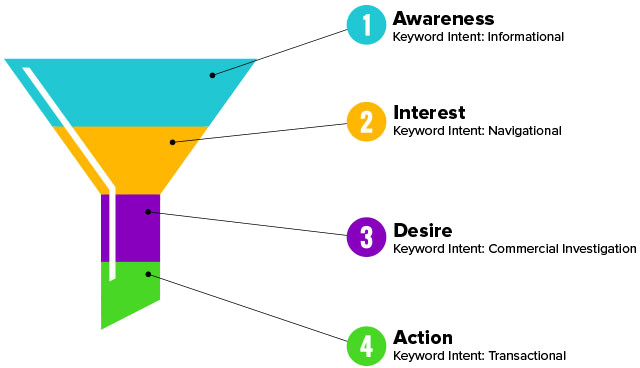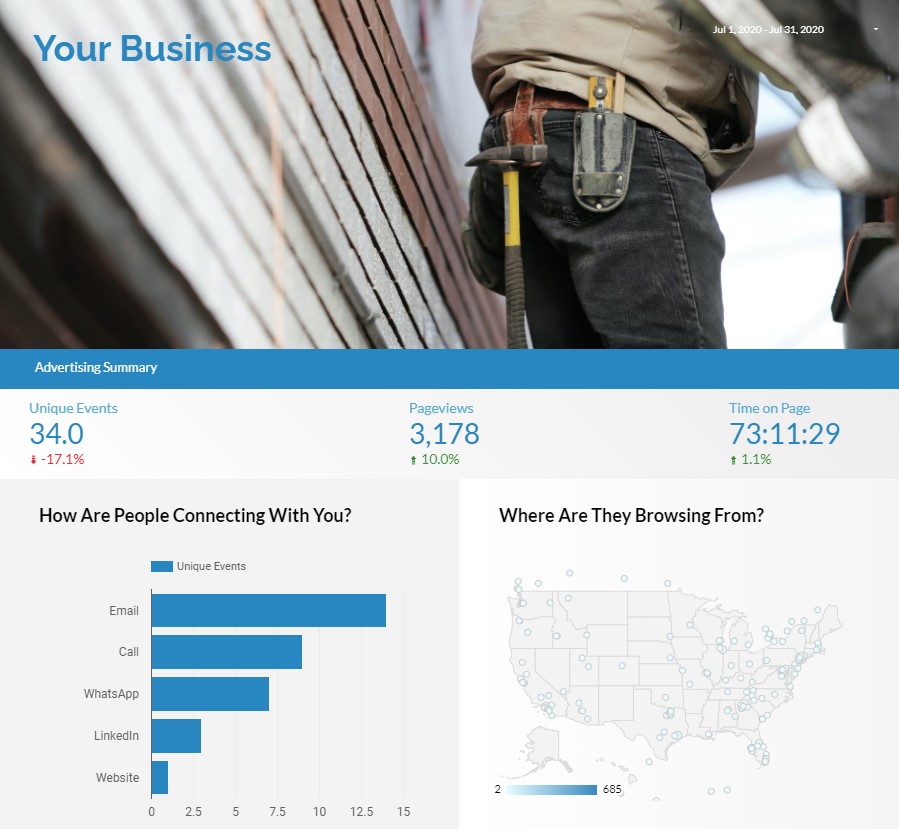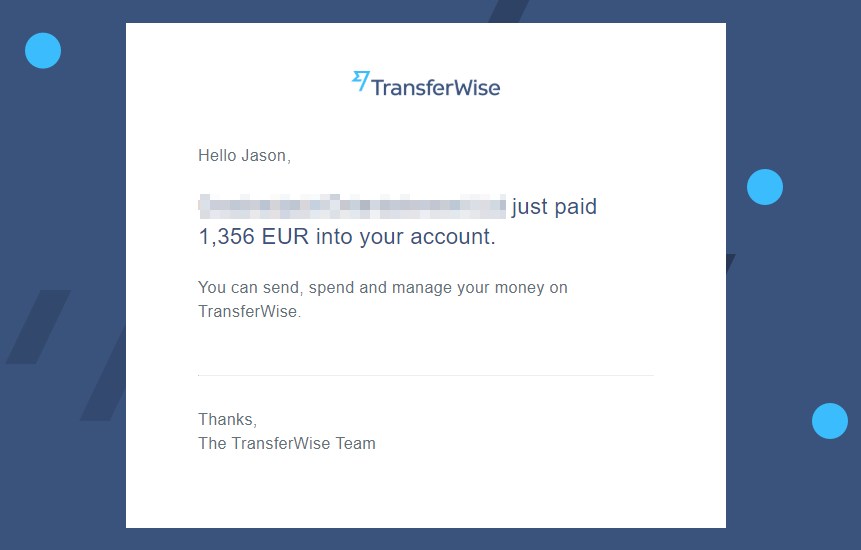Work when you want, from wherever you want, and build financial security, all in the same process. Clients won’t own you, you get semi-passive source of income, and most importantly, your efforts go into building your own assets instead of someone else’s. Sound good?
When built correctly, this is what you can achieve with rank and rent websites.
You could build an extensive website complete with many blog posts and service pages, or a simple single-page site. I like to focus my efforts on the former of the two and in this post, I’ll explain why.
But first, let’s answer the one question running through your mind right now.
What Are Rank and Rent Websites?
The rank and rent business model is fairly straightforward. Just as you can out rent a space in the real world, you can do so in the virtual world too.
Using the website rental business model you:
- build a website in a niche of your choice
- get it to rank well in search engines using SEO, and
- proceed to “rent” it out to local businesses.
The better you rank in high demand industries and locations, the more you can charge.
I’ll cover this in more detail below, but it’s important to know that renting your website isn’t the only way you can generate income. I only find renting to be the most “straightforward” to sell.
Taking the Micro-Authority Route
An excellent rank and rent website is one that gives the reader all the information they could need on a topic.
I’ve come across a lot of people who build and rent simple websites, sometimes only with a single-page. They never go much larger than that and are satisfied with the income it generates. To me, this is a short-sighted approach.
I like to think of rank and rent websites as micro-authority sites that genuinely help the reader. By producing the best content within your niche and answering all of the possible questions that they have, users and search engines treat your site differently.
The aim is to create one really good, super-informative website on your niche. In my experience, this helps them to stand the test of time (and algorithm updates). Done well, it can crush the competition.
There are some other benefits to this route too. Quality links aren’t getting any easier to find. If you have a domain with excellent links, you should get that domain ranking for as many topics as possible.
More exciting and less obvious, however, is that you can actually rent individual pages or articles to local businesses, squeezing more revenue out of each domain.

Moving from “Clients” to “Advertisers”
As a long time SEO, my job involves providing SEO services to clients who want to grow organic search traffic to their website.
As riveting as that may sound, something I learned in my freelance and agency days is that I can’t control every aspect of a client’s website.
I’d help them to rank well, but it was almost guaranteed that someone would end up breaking the site, and search rankings.
Maybe they’d migrate to a different hosting provider and forget to copy over the robots.txt file, or they’d decide to change a high-value URL without setting up the right redirects.
Unfortunately in those scenarios, it doesn’t matter who is at fault, it reflects poorly on the person responsible for organic search traffic.
Rank and rent websites are the complete opposite. You get total control over your website. From the niche to the keywords, links built to the content length, CMS to the hosting — everything.
It takes the SEO agency model of selling hypothetical future results and flips it’s on its head.

Once you’re ranking well in Google, you can easily contact a business and say “My website is number 1 in Google for this keyword that accurately describes your service, do you want me to put your contact details on the site? You can be number 1 in Google in 5 minutes”.
In some scenarios, I’ve actually put their contact details and even a profile photo on the website first, then told them to Google the keyword and “click on the first result.” It makes for a compelling sales pitch (though as a warning, not everybody loves this)!
Pre-ranked websites offer real proof of success, whereas SEO services only offer a promise. Clients are much more likely to get on board with an idea when they can see it performing upfront.
Heck, if they’re not sold on the idea, you can give them a free month of leads to try it out. What do you have to lose?
Building Your Own R&R Website From Scratch
Creating a website from the bottom up is no easy feat. If you’ve worked with websites, you’ll know that there are many moving parts. In the first weeks of building a new site, there’s a lot to be done and it can be a hectic time.
I try to take a simple yet effective approach to building sites. Rank and rent mastery comes through efficiency. The cheaper or faster you can build these sites, the quicker you can get revenue and move onto bigger things.
While you’ll need to put in some hard work in the early days, if you’re using the right inputs your rank and rent website should be self-sustaining, or at least low maintenance after the initial set up phase.
Below are the basic steps I follow when building websites I intend to rank and bank.
Find Your Niche
I wish I could tell you choosing rank and rent niches was as simple as writing on just about anything you love.
Bum bow!
Stop following your passion, and start following the money!
Renting websites to businesses is easier in some niches than others. Niche selection is an important step in website building. Don’t make the same mistake I have in the past and build audiences without a clear idea of how you’ll make money from them.

Any industry where salespeople want leads is a good place to start. Some popular niches are:
- Accounting and auditing services
- Automotive repair and parts
- Emergency plumbing
- Emergency towing
- Legal and administrative services
- Machinery rental
There are plenty more to choose from, obviously, but reading lists online are usually a bad idea. If they’re popular, they’ve often been done to death. Niche selection and keyword research is a muscle that needs to be developed if you’re going to dominate in Google.
I find it helpful to choose a specific niche with a tight focus. To help narrow down your options, look for rank and rent niches where:
- The service or product being sold is consultative. When people need to “request more information” or “get a quote,” it’s often a good fit.
- There’s some urgency involved. I’ve sold things with enormous sales cycles; 12-24 months. The right advertiser will understand this, but truthfully, many don’t realize this about their own business and are oblivious to the very long sales cycle of their service. If you can get leads for “emergency %keyword%” your life is going to be a lot easier.
- The service/product is high value. With the right niche where a sale is worth tens of hundreds of thousands, you might only need to bring in 5 leads per week. With the wrong niche, even a hundred leads a month might not be worth it for the advertiser.
- There’s less sophistication. You shouldn’t shy away from competition when there’s money to be made, but for some reason, one niche can be high competition while another can be extremely easy. Why make life hard for yourself?
As lame as it sounds, I like to think globally and act locally. Pay attention to what people are doing in high competition cities, and see if there are other locations where that strategy isn’t being used. Or maybe you can observe strategies used in a high competition country like the UK and apply it in Australia?

Combining this strategy, along with adding “informational intent”, high-quality blog content helps my sites to dominate the search market, while also ranking for transactional, local keywords (suburbs, cities, counties, states, etc).
Register a Domain
Don’t overthink this part. While some people will fake action for weeks on choosing the perfect domain, I just settle on something that is relevant to my niche while still sounding like a brand.
You can use a location in the domain if you want, but remember it limits you to only ever targeting that location.
I’m finding that exact match domains are becoming less reliable to rank as you don’t get the luxury of using branded anchor text when you build links. I prefer to play the long game and build a brand that isn’t cheap/tacky as remember, other local business owners need to want to be associated with it.
Where possible, pick a .com domain. .co seems like a great idea except for the fact that everyone will always type .com when trying to revisit your site. This will represent lost traffic and leads in the long run.
Keyword Research
Keyword research takes into account the characteristics and unique qualities of the readers who will be consuming your content.
Your content should be aligned with their wants, needs and lifecycle stage. That is, how close they are to making a purchase and what their intent is.
When done correctly, keyword research can help to:
- Give your content the direction it needs
- Identify what your readers are looking for
- Structure your content
- Brainstorm on relevant topics to talk about
- Remove any obscenely high competition ideas
Keyword research tools like Ahrefs can really help here. Of course, if research isn’t your thing, my team at Dialed Labs offers keyword research services to make this part a breeze.
Content Map
Now that you have a list of keywords ready, it’s time to create a content map. Sounds difficult, but it’s straightforward. All you need to make is a spreadsheet with all of the content you plan to add to your website.

Your content map will include your home page, product or service pages, and any blog posts. Any URL that you want to rank for a keyword.
Consider your content map an opportunity to plan out each piece of content. Mine include titles, URLs, keywords and approximate word counts. Unless my personal name is going on the article, I don’t write an outline.
If a writer can’t produce a decent piece of content from reading a title and 5+ keywords, they probably aren’t going to be a good fit.
On Using WordPress
I like to use WordPress over any other method when it comes to building websites. Will your site be faster if you build it from static HTML? Probably. Are there new headless CMS options that can provide greater security? Sure.
But what I’m interested in is a lack of friction. It’s easy to find a WordPress dev. Editors and writers know how to use WordPress. When selling, WordPress sites are easier to offload and sell for higher valuation multiples too.
When I spin up a new rank and rent site, I use Flywheel hosting for its simple set up process. By using a “blueprint,” I can easily have a site online with a custom theme and my favorite plugins in 15 minutes.
Once a site is making money, I put it into maintenance mode where broken links are fixed, and other small tweaks are made based on latest best practices. Easy.
Outsource the Writing
Unless you have a lot of free time, it’s best to pay dedicated content writers that can have the work done quickly.
It frees up a lot of time that you can otherwise spend planning your SEO strategies or brainstorming relevant topics for new or existing sites.
Find writers who have enough experience writing on these types of sites, or on the niche your site is about. Where some people like “SEO writers,” I actively avoid them as I find they have bad practices that need to be “unlearned.”
Having a content checklist in place is a good idea. That way, even if you have multiple writers on the project, you can maintain uniformity with content. It also means you don’t need to explain your needs every time you engage a new writer.
Link Building
To get ahead with SEO, you need links. Links from other websites to yours are a signal to Google and other search engines that your site is reputable.
Some of the best ways you can acquire backlinks are:
- By writing guest posts on other blogs that link back to you
- Through outreach campaigns where you email other website owners asking for a link (yeah, those annoying people)
- By commenting on news stories or speaking with journalists using services like “Help a Reporter”
- Sharing helpful answers on forums and sites like Quora, including a link to back up your point

Goal Tracking and Reporting
Speaking of results, keeping track of your website’s performance is important both for you and your advertisers.
You’re going to need real data before you start pitching to prospective advertisers. It’s just a whole lot easier when you can account for how well your website is doing.
Setting up a Google Analytics account is the simplest way to access this data. You get insights on your website traffic, how many visitors convert to leads, and the pages that your visitors engage with the most.
It might feel too early to think about reporting, but by installing Google Analytics shortly after building your site, it allows you to use real-world data in your sales pitch to advertisers.

Your report doesn’t have to be custom branded though I like to do this in Google Data Studio. Most advertisers are happy with a simple spreadsheet or a PDF export from Google Analytics, though.
Let it “Marinate”
Climbing to the top of Google’s search results can take time. With a fairly new website, it’s not going to happen overnight.
Given time (and links), more and more people will start to discover your content.
Once you’ve made it to the top 10 in Google’s search results, the real fun begins. It’s time to start pitching to people who could benefit from a spot on your website.
Since your website is new, you could offer a limited-time discount to encourage them to advertise in the early days. I’ve offered deals where the first 3 months are 75% off, the 3 months after are 50% discount, and the 3 months after that are 25%.
All of this changes when your website hits the top 3 spots in Google, of course. At this point, you can begin charging more for the privilege of “the top of Google.”
With the rank and rent model, clients are most likely to opt-in and rent your site on a monthly basis. I request all advertisers commit for 3 to 6 months before deciding if it’s worthwhile. After this time, they can choose to continue or cancel.
Earning From Rank and Rent Websites
How much do you make with rank and rent websites? Are they really as profitable as they sound?
Most people I know tend to settle for lower amounts on their rank and rent sites, earning as little as $250 per month per site. The upside is much greater, though.
Creating a 3-page website with low-quality content and expecting to earn thousands each month isn’t a recipe for success.
Quality websites make money because they have something which other businesses seek — attention. The more visitors your website has, the better your chances of monetizing it.

But it’s not just about visitors either. Getting 1,000 children from Canada to visit a website about window installation in the UK is hardly valuable. If they aren’t going to “enquire for a quote,” those visitors bring limited value.
Think of your website as an important link between buyers and sellers. Buyers in this scenario are your readers and sellers are those who are willing to pay you to advertise their products/services on your website. Your website connects these two parties in exchange for money.
Charging Rent
Just as property is a physical asset, websites are digital assets that you can rent out. Think of your website as a billboard that thousands of people see every day.
You’re allowing a third party to use some of your space for their advertising in exchange for money.

The simplest strategy for monetizing one of these websites is charging “rent.” This is fairly easy to sell if the business is already used to paying a monthly retainer for their SEO to be managed by one of the many agencies out there.
It’s especially easy if they are bidding on Google’s PPC ad results for the keywords your site is ranking for.
Depending on how well your website ranks, how many leads it generates per month and the value of the leads in that industry, you can propose a flat monthly fee that makes sense to the advertiser.
Charging Per Lead
With an authoritative site that ranks well for valuable keywords, you’ll be generating sales qualified leads — something many business owners and sales hustlers will pay good money for.
Selling and charging per lead is a popular and lucrative method of ranking and banking, but it also comes with extra work. Be prepared to spend your time tracking, monitoring and qualifying the leads that come your way.
There are ways to automate some of this process, but it does bring complexity and/or expense to an otherwise simple way to make cash online.
Setting Up a Commission Deal
When you’re an authoritative voice on a subject, people turn to you for advice.
Does this mean you have to personally answer every message and query on your website? Hell no! Engage a reputable professional in your niche to do this for you in return for “free leads.”
Let’s say you own a website on moving abroad. You might get a hundred leads each month asking you which international moving company to use.
Strike up a commission deal with a broker who will close sales. Any time they get paid, you take a 25% cut.
This solves many problems at once. Your readers can easily contact someone with extensive knowledge to help them find what they need, and you get a commission out of it.
Most importantly, you don’t have to do sales all day long. I get commissions from businesses in countries I’ve never visited. I don’t hate that.

Selling the Website
Building a kickass website just to sell it off may seem counterintuitive. You’ve just put in hours and hours of hard work to make it number one in Google, right?
Well, sometimes selling advertising on one of these sites is more difficult than you first predict, and you need to change plans.
If you’re asking “how much are you getting for your rank and rent site sale?”, like most things online, “it depends”. From my point of view, as long as you make more than you originally invested (including your time), you can reinvest the profits over and over to a point where you have snowballed it into a nice sum, or a portfolio of sites.
There’s a lot to be gained from ranking and selling websites. I’ve written in detail about investing in websites too if you want to read more on the topic.
“Maintenance Mode”
Websites are never truly passive. Once built and generating cash, they still need some attention.
This may involve updates, security checks, performance tweaks, or something else. Depending on your niche, content can go out of date and also need updating.
Auditing and Improving Technical SEO
If you want to continue ranking well in your niche, you’ll want to do a regular SEO audit. Every time you make a few “minor” changes to your website’s content or theme, you can end up breaking your SEO without knowing.
A technical SEO audit is basically like a health check for your site. It helps you identify critical issues that could end up hurting your rankings like:
- Poor website speed
- Broken links
- Insecure content or expired SSL certificates
- Making it difficult, or impossible for Googlebot and other crawlers to discover and/or index your content

Optimizing Your Initial Content
Instead of hiring a bunch of writers to create new content, after your site has been online for 12+ months, your next content changes should involve improving what you already have.
Let’s say your website has 25 pages, but only 5 of them are on page 1 of Google. You’re already sitting on a good amount of untapped potential.
These pages should be ranking well for the keywords that are assigned to them in your content map. If they aren’t, something is likely lacking in your content.
Content optimization involves analyzing one of your pages against the pages that are performing really well in Google. You’ll want to review and revise all elements of your content, such as:
- Page title
- Meta description
- Heading tags
- Body text
- Alt text
- Bold and italicized text
The goal is to make your content work as hard as possible. There’s no need for a hundred pages when 25 of them are doing all of the heavy lifting.
You don’t always have to rewrite it from scratch. Sometimes it just involves adjusting keyword usage, while other times, you may need to write a few extra paragraphs or some FAQ questions to make it outperform the current position 1 holder.
Rank and Rent Websites: Lifestyle Assets?
I’ve written about building lifestyle businesses, reclaiming a better work-life balance, and how financial independence creates freedom in my life and the lives of others.
For anyone moving towards the goal of financial independence but without the means to save a lazy few million dollars in a short period of time, building a rank and rent website can be a shortcut to this goal.
With the “time-efficient” income I earn from sites like these, I get to focus on the things in life that truly matter. Ironically at this stage in my life, this time is often spent on bigger business opportunities, but also gives me time with my family or flexibility to go for mountain biking or to the gym.
I look at rank and rent sites like mini assets — they work hard for me while I sleep. I explain this and their contribution in my post about entrepreneurial investments.
If these types of sites are something you’re interested in, I encourage you to learn by taking action. Few people talk about these types of businesses, and while there might be a few courses, nothing will teach you more than executing.

Hey there, this is a great article but do you know what I cant find anywhere? It is what to put on your site Phone number wise or whatever while your getting it to rank? You obviously don’t have client at this point so I can not find anything talking about what to do before you get the client. Any help would be much much appreciated.
Hey Brandon, thanks for following up with this question. I am yet to ever need a phone number to rank. Maybe it makes it easier, I’m not sure, I don’t have the data to prove/disprove that either way. This said, before I rent a site, I’ll usually have an email address or form so I can get example leads, which I can use to show my prospects.
As far as the tech goes, I like Twilio. For only a few dollars you can get a local phone number, record a prompt and have the lead leave a message which is sent to you via email. This could be a good alternative for you that is ridiculously cheap. A cheaper option my friend uses is Plivo. If you want an easier option to set up, CallRail makes things very easy (but is pricier).
Unsolicited advice: don’t overthink the process and keep everything as simple as possible. I have some sites where I track the calls but other sites have the advertiser’s number on every page.
Hoping this helps!
As an owner of a rank and rent business, I have to say this is better than most guides I’ve seen.
Thank you,
I am learning a lot reading your articles.
On your “moving abroad” example. Sending leads to a broker with the agreement they will pay 25% commission on any converted sales.
How do you protect against them making the deal, then cutting you out?
Hey Michael, if it’s a serious enough deal you can write into your contract that you can audit their books on demand X times per year. You’ll pick up fairly fast when something doesn’t add up though. Commission based deals are often built on trust – even sending to an affiliate network doesn’t guarantee the merchant won’t deny a few payments to tip things in their favour. I don’t have a better answer for you, outside of “it can take some trial and error to find someone you can trust”. Hope this helps.
How do you go about hosting when you’re managing multiple domains? Do you use reseller accounts? Any advice here is appreciated, thanks!
I’ve yet to see an article that addresses the legal aspect of rank and rent. How do you handle the terms and conditions and privacy policy. Not to mention you are pretending to be a business then selling the contact information to a 3rd party. What is your experience with this?
This comes down to configuration. You’re talking more about lead generation and selling the individual leads. With rank and rent typically you’re selling the space on the site where the contact details go. This means you never see any names or personal details of each lead. It might sound like splitting hairs but it does away with a lot of hassle.
T&Cs and Privacy Policies are the wild west regardless of the type of site you’re running. You can pay 10 lawyers and get 10 different outcomes, buy one off an online generator or write it yourself. You’re still “exposed” to some degree.
Hi Jase, thank you for this great guide. I was wondering, what do you do with the leads in the early days? Before you have an agreement in place with a client. Would you pass them on as free leads to demonstrate value? Thanks
Hi Michael,
I’ve done this a few different ways in the past.
1. All the leads come to me, so I can validate they are quality. I then manually intro those people to companies that can help (with everyone’s permission). It’s a hassle but it helps me to learn a lot.
2. A few times I’ve added a person who I think is a good fit to a site without them knowing. They’ve started getting leads for a few days, then I’d follow up and tell them why, show them how it all works and see if they’re keen to do something long term.
3. Direct them to a mailbox with an auto reply saying there’s overwhelming demand and a delay in responses. When someone pays they get access to this mailbox and can follow up with those leads.
I’m sure there are better ideas out there though, don’t let these ideas limit your options!
Hoping this helps.
Hi Jase, awesome ideas! I hadn’t really considered any of them.
I was also wondering, and sorry if you have covered this elsewhere, for someone just starting out, do you think it pays to invest a bit into WordPress pro/business and professional-bought templates, or could you make do with a free theme on WordPress for a while? Thanks
One of my favourite R&R sites ran on Twenty Seventeen for the longest time. That was more to prove the point that it can be done and that the bare minimum is often good enough.
I use Flywheel hosting for a lot of sites and they give free access to Studiopress themes. They are a perfect base for me as most are very lightweight, then for anything on top I just use a child theme.
Hey Jase,
Great article. Curious though, my website is fairly new (couple months) but pretty much all of my leads coming in are via phone call/voice mail messages, but don’t have a client yet. What would you suggest to do with the calls and voicemails coming in as I have no one to direct them to at this point. Any pointers would be great!
Hi Max,
Thanks! What has worked well for me is to get to know some people in the industry. That is, some potential partners/renters. Say you are getting leads for… home painting. Ring around a bunch of painters and tell them “I work in the home services industry and sometimes I get people in need of painting work. I want to send them to someone I can trust, do you mind if I refer them to you?” At this point they might already offer you a commission deal, but if not that’s fine.
Now when someone calls/leaves a voicemail, take down their details and promise a call back. Send all of these to your new found friends for free. If you’re sending them 10 a month for free, you’ll soon find out if they are good leads or not. In 3 months’ time when your site is cooking along well and you pitch your partner on a sale, either they will jump at the opportunity (they have already closed a good deal of your leads), or they will tell you they aren’t interested (in which case it’s possible your “partner” couldn’t make a sale to save their life), meaning it’s time for you to try the same strategy with someone else. Rinse and repeat and before long you have your site rented.
Note: there are probably high tech ways of handling this but I like the lo-fi stuff as most of the people you are sending leads to don’t understand technology like us internet people. Keep it simple and all that.
Hoping this helps man!
Jase you’re the man! Thanks so much for the insight. I am going to give this strategy a go.
Hi Jase,
Thanks for the great article. I must have been living under a rock to never discover or think about this idea.
As a freelance website developer I am definitely going to implement this in my country as there is a huge gap for this and low competition for ranking.
Thanks, once more!
How can you pass verification in GMB when you have only one address etc??
Hi Darren, this is getting more and more difficult. For this reason I rarely use GMB listings these days – I focus on building a brand website instead. You can usually find someone who has an address in the area you want to service, and if you don’t want to do the leg work yourself there are vendors on different sites out there, but there’s no telling how long they will stay online as Google seems to be doing a big clean up on them.
I’m in the process of setting up my first rank and rent site, in the UK. Getting GMB verified seems to be difficult, but I do have a valid address that I can use for my first site. Going forward it looks like actually renting property may be the best solution. It’s a big overhead, but people are making enough from their sites to justify the cost – I’ve seen competitors in similar niches who are doing exactly this.
The benefits of having a good GMB seem high: instant visibility in search and extra ‘trust’ in your site, both from a visitor and Google perspective. Have you seen a difference in overall revenue between sites with and without GMBs, Jase?
Hi Richard,
In the end this type of thing comes down to strategy. You can choose to make GMBs core of what you do (and find ingenious ways to get addresses/validation), and reap the benefits. Or you can choose to do otherwise. It’s really down to choice.
Comparing for/against isn’t going to give you a clear answer. For example, it’s very possible a straight content site plus Facebook Lead Ads on your remarketing audience will outweigh the benefit of the GMB hassle. Sorry, I know this doesn’t directly answer your question.
In a perfect world, would I have the GMB? Yes. Would I pay thousands in rent each month for an address? No.
Hoping this helps in some way!
Hi Jase,
Great article! I already found a client before building out my R&R. Someone recommended me not building my own R&R property – just build out his. Thoughts? If that’s the case would he have to give me access to his website and everything else? How would I track everything then? Install a tracker?
Everyone who searches for him, just searches for his business. How would I determine where the business is coming from from that point on? Thanks so much!
Hi Cristina,
If you’re building out his website for him, in exchange for money, you don’t have an R&R site at all. You’re selling SEO services to him. This can be easier in one way as you can leverage his aged domain and existing backlinks but you own absolutely zero. When he feels you’re not getting the right results or doing things in a way that he needs, you’re done, and you have nothing to show for all that effort.
It’s a perfectly fine business model, but don’t confuse selling services with owning the underlying asset.
RE: tracking which keywords people are using to find his business, you can get some of this data from Google Search Console.
Hey Jase–do you have any articles on pricing these “rentals”? I understand that pricing will be highly dependent on the advertiser, niche, and keyword volume, but was looking for a starting point. I’ve got about 10 keywords ranking #1 on Google and would like to start some outreach.
Hey Zach, I haven’t written anything on this but it essentially comes back to the value of a lead. Ask yourself:
From there you can work backwards and settle on the value of your site. If it’s early days and you’re just trying to get a little cashflow right now, consider offering a dream deal like 75% off for the first 3 months, then 50% off for the 3 months after that, at which time your site should be cooking with gas.
Hey Jase,
Love the article. I’m just learning about this, it’s an excellent business model.
Are you limited to only renting a website out to 1 client at a time? For example if I have a website generating leads for a computer cleaning service, can I only put contact information for 1 client on the page? Or can I have multiple contacts at the same time? Meaning I could get multiple incomes from the same website.
Essentially what I’m getting at it is.. Do I need a separate website for every client I plan on renting to?
These might be self-explanatory questions but like I said I’m new lol
Thank you so much!
Hey Brady, this is all up to you; I’ve done it both ways.
Sometimes it’s easier/best to have a single set of contact details across the whole site, and that is what the advertiser/renter is looking for.
Other times I’ve had a micro-authority site on a topic but the services span multiple business types. In that scenario, there is no one business who wants to rent the whole thing. For example, a site about home renovations in Arizona. It has pages that generate leads for extensions, decking, re-roofing, fencing, kitchen remodeling as well as insurance. By renting those pages out to different businesses, those businesses get the most relevant leads possible. It also allows you to dominate Google with lots of relevancy.
Another example is when you have a site with a single service but multiple locations. For example, emergency towing in London, Manchester, Bristol, Birmingham, etc. You may be lucky enough to find a country-wide partner, but it’s more likely the smaller businesses will rent the page/s of their location/s from you.
Pros and cons to both, though diversifying income is nice if you’re reliant on it.
Hoping that helps!
Awesome article! I started offering geo landing pages for clients as a scalable way to rank for local terms and grow traffic in specific areas, but I love the potential of this model to own the leads and position myself, but still get immediate profits from businesses.
I have read on other sites that when building these sites you should focus one site on one geo and one service and build a Microsite with an EMD like: Nashvillepaintingcontractor.com, but in the comments you seem to indicate that you can still successfully rank for a specific niche with one site, but geo pages for each market. I see potential to buy a niche focused domain and build out hundreds of geo focused pages and then package them together and rent those pages as a monthly + CPL and track with Call Rail so you can verify leads and prove value.
Does this seem like a viable model or do you think I would struggle to rank without a local EMD on a Microsite?
Thanks!
Hey Dave, thanks for commenting. I think one of the challenges of online marketing is, there really are no rules. I personally dislike EMDs these days. From a branding perspective it looks cheap and I’m usually endorsing services that are higher end, so I don’t want to turn away quality leads due to cheap tactics.
All of my current domains are partial match. Using your example this could mean something like helpinnashville.com or findapainter.com. The first example could be a site that lists all sorts of services in Nashville, while for the second one could be country-wide but obviously only relevant to painters (still, there’s internal painting, roof painting, fence painting, car painting, furniture painting, probably all sorts of obscure stuff to explore).
When building out other niche sites, they are often not even partial match, but they mean something to the audience. So running with the painting example, if I was targeting painters maybe I’d use cuttingin.com or sizeline.com or something. Maybe this hurts how easily it ranks short term but to me it’s the difference between building a brand vs a cheap affiliate hustle. Take a look at what is ranking out there, you don’t need an EMD or partial match domain to dominate!
Hoping this answers your question.
Do you create google my business listings for your r&r sites?
Hi Caroline, I have done so, however I have changed my R&R model to niches where a specific address (and GMB listing) doesn’t matter/is irrelevant. As a result I only have 1 site with a GMB at this point in time.
Hello! Jase
Thank you for your great article and serious comments!
I want to establish R&R websites in a small Canadian city. I have two questions.
1. Should I use the .ca domain name or .com. Considering the domain name protection, do I still need to register the .net and .org domain names?
2. Can I build a niche website and rent it out to 3~5 customers instead of 1 customer after getting the ranking? Customer costs are low and my success rate is higher.
Looking forward to your reply.
Warmest Regards,
Freedom
Hi there,
1. I’m not convinced it matters much for Canada. Most Canadian companies I’ve worked with over the years use .com, but there may be a slight benefit to a .ca as time goes on. If you’re specifically targeting Canadian customers only and use a .com, just select Canada in the geo settings of Google Search Console. Unless you’re building a massive brand, don’t worry about .net or .org.
2. Sure, I have done this before (renting individual pages instead of the whole site). Please check the comments as I’m fairly sure I’ve mentioned it.
HTH!
Hi Jase,
I just created my first rr site. I decided to go for an industry that’s a bit tough but my city is growing so there is a lot of opportunity out there. The site is good to go but when speaking to a friend of mine he brought up the question of insurance. For example, with the site being mine and the phone number going to the client, do I bare any liability for the contracts or since it’s the client that owns them they most likely would be responsible?
Hi Jorge, this is a great question for a lawyer. I have no legal expertise so I can’t give you an answer on this, but one thing I will say is, there’s always a reason why you shouldn’t do something. Sometimes when you’re bootstrapping you need to be scrappy, and spending thousands on legal counsel might hinder the initial growth of your business. A good stop-gap measure is to register your business as an LLC. By doing this you reduce the liability on yourself. Hoping this helps!
Hi, Jase
I hope this email finds you well and healthy.
Inspired by you, I established my first R&R website, and the results are encouraging! Thank you!
There are two questions:
1. This is a local auto insurance website. I suddenly felt that the unit price of this niche was too low, right?
2. Based on your experience, should I rent this website to 3 people at a lower price, or to one person at a higher price?
I read the comments on your website carefully, but I didn’t get any more inclined suggestions.
3. Should we write our own mailbox, or should we write the tenant’s mailbox? Then we have no customer information.
Warmest Regards,
Cai
Hi Cai,
Hope that helps!
I have a question.
There can be two approaches to ranking for local terms.
First, via landing pages, you pretend as a business (painter in nyc) and sell the leads to some local business.
Second, via blog posts, you make list posts like “5 Best painters in nyc” and link to all of them or list their numbers and get paid per lead .
The second approach seems ethically better IMO but do you think list posts will be able to rank like simple landing pages? Like will this cause an issue from “search intent” perspective”
Hi Ansar, I find these questions tough to answer because if someone comes back to read it in 2 years time and the search landscape has changes (and it will), the answer will be wrong.
I’ve ranked pages/posts that have the ‘wrong intent’ by being better anyway (though the intent may be for landing pages, they all suck, so my blog post still wins), and by actually having links.
The most important feedback/response I can give you is to try and test. What’s the cost of finding out you were wrong? 2000 words? The payoff could be 100 leads per month.
Thanks for the great article. Do you have a website we can look at as an example? Specifically one that is renting out different pages to different businesses? If I did that, would I list a different phone number on each page and then have Callrail for each number, so that I can track the leads for each business/industry?
With this kind of approach vs a one niche local site (ex: A/C repair in Wichita), I am thinking it would be more difficult to get backlinks? For the one niche local site, I could just research the other A/C repair companies appearing on Page 1 and see what backlinks they have and then try to obtain the same ones. Would it work the same way for a more branded site?
I like the income opportunity though for a branded site vs a one niche site. Instead of renting out each site for $500, it would be nice to rent out 8 different pages on one site for $500/page.
Hi Mike,
I don’t have any examples at this time but I am thinking of building a new one from scratch as a case study so people can follow the process step by step. To answer your questions:
Hoping this helps!
Deep knowledge… Just wanna confirm that when you build the new asset… do you start with the single location/city? If yes, so you normally set that main location/ city page as an homepage? What if you want to expand?
Thanks
I’d much prefer to rank in an entire country or state than just a single city, so as a result I wouldn’t include the city in my domain name, and my home page would target a more general keyword such as the state/country, possibly
near me, or even just the brand name.Hi Jase
Just wrapping my head around this model – thanks for the information. What I am not completely sure about is how it practically works when you rent the site out.
Let’s say I create a website for “DublinDental.com”.
1. What do I do with the initial sporadic leads that may come before I get many leads.
2. If a dental surgeon in Dublin wants to rent the site, am I expected to change the design to match the renters branding? (And then change it again if I get a new client?).
3. What about the clients existing website? Do they now have two websites?
4. If my url is DublinDental.com but the person renting it has a business called “McLeod Oral Health” how does that work?
Thanks again
JP
Hey JP, thanks for your questions.
1. Anything you like. Speak with them to learn more, even try to book them in with some relevant dentists or just ignore them.
2. Yes, or no. You own the site so you set the terms. I generally keep my proven designs and simply add their contact details. You don’t even need to add their business or personal name if you don’t want to.
3. Yes.
4. There are simply two websites with different names.
Sounds like you’re overthinking this. I can set up a “renter” on one of my websites in 15 minutes. Simply accept their money and send leads to them and everyone is happy.
Hi Jase,
2 questions:
How important are Google Reviews when trying to rank for a specific niche?
I’m in a niche that is a bit hard to get backlinks for. Do you have any generic advice on getting more backlinks?
I’ve launched my first R&R site and started to build my second. The hardest part is waiting for the ranking to commence.
Hey Robert,
Hoping this helps!